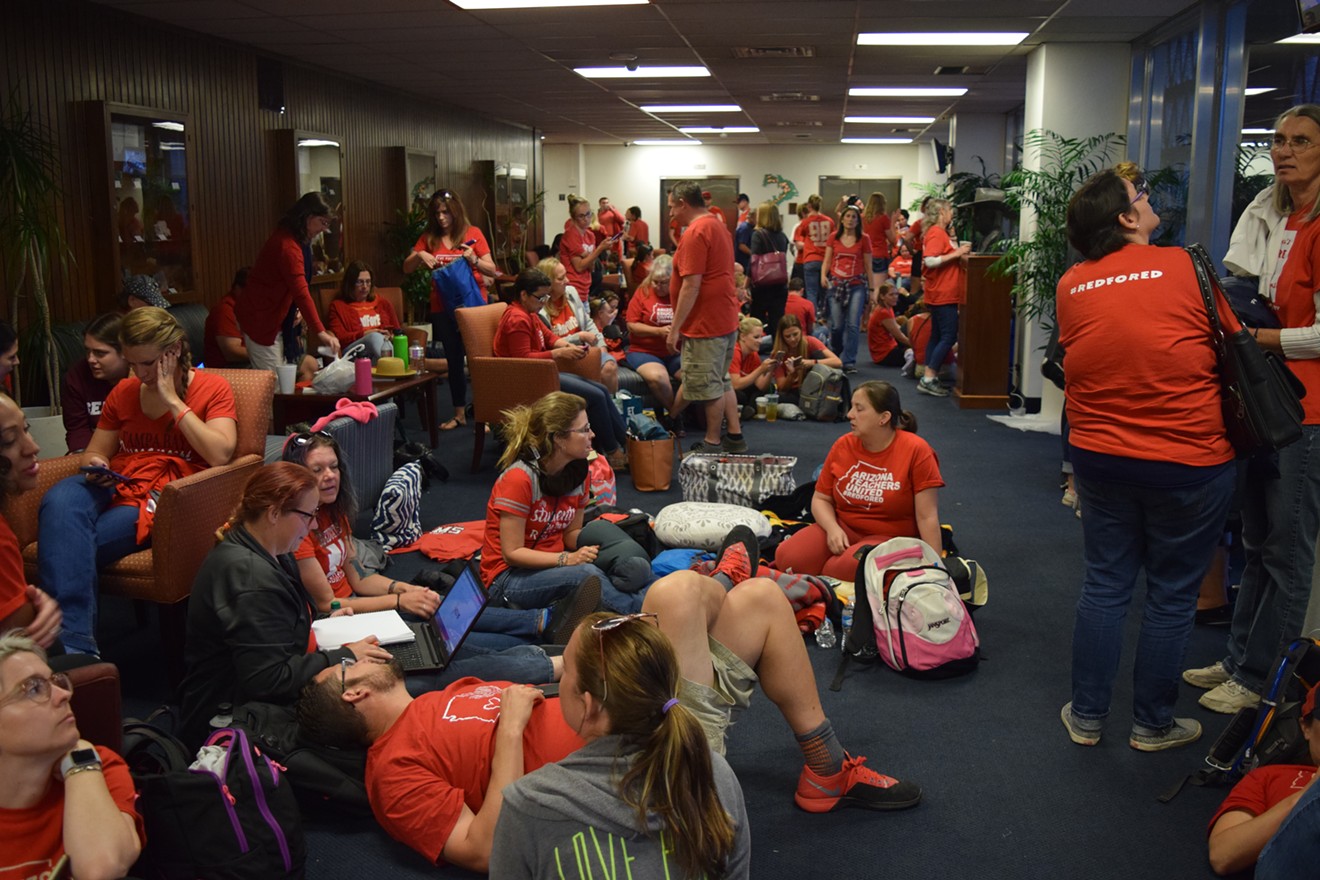The deal paves the way to ending the teachers' strike that stretched into a sixth day for many Arizona school districts.
Procedures dragged on until the early hours of Thursday morning as teachers led by grassroots organization Arizona Educators United and the Arizona Education Association watched the budget negotiations from the galleries. Ducey signed the budgetary measure that provides for the teacher raises, HB 2663, around 6 a.m.
The organizations that spearheaded #RedForEd said that they could not support the budget package, although they pledged that if lawmakers delivered a budget by Thursday, they would end the walkout.
AEU and the AEA said that the plan for a 9 percent teacher raise next year ignores support staff and the idea of replacing the $1 billion in school funding that was slashed after the 2008 economic crash.
The education budget bill passed 33 to 26 in the House and 20 to 9 in the Senate. #RedForEd teachers convinced Democrats that Ducey's so-called 20x2020 plan was too weak, and many voted no. Like her colleagues, Representative Lela Alston explained her vote by saying that she was voting no "with a heavy heart."
"I know if we had worked together, we would have done a better job to meet the demands and requests of the #RedForEd movement. That is not just about teacher pay," Alston said.
Teachers have been on strike for better pay and school funding since last Thursday, and leaders of AEU and the AEA pledged that educators would return to classrooms if lawmakers gave them a budget. Some #RedForEd teachers were upset with the announcement — they wanted a walkout to wrangle more school funding from the Legislature, and the impression that AEU threw in the towel stirred up confusion and even anger among the #RedForEd supporters.Signed.
— Doug Ducey (@dougducey) May 3, 2018
Teacher raises are on the way.#20x2020 pic.twitter.com/YMZN3IG7ZY
Republicans like Representative T.J. Shope, however, said that the proposal is solid. Like Ducey, they argued that the funds for ongoing teacher pay is a major step forward from past teacher raises, starting with a 9 percent raise next year and culminating with a net 20 percent raise by 2020.
"Oftentimes as we do, we let perfect be the enemy of good, and we're doing a lot of good here," Shope said.
Whether the funding increases will translate to a 9 percent teacher pay raise across the board in all districts is an open question.
Although the pay raise is set to go into the base funding formula that the state uses to calculate district dollars, ultimately it will be up to district administrations to decide how the money is used.
Lawmakers rejected a series of Democratic amendments to the budget.
Democratic House members sponsored five amendments, including a proposal to cap class sizes at 25, maintain a student-to-counselor ratio of 250 to one, and use results-based funding dollars to bankroll raises for support staff. They all failed.
Before voting down these proposals — which were sponsored by Representatives Kelli Butler, Mitzi Epstein, and Randall Friese, respectively — Republican legislators raised the specter of unfunded mandates and overreach into the purview of school districts.
Speaker of the House J.D. Mesnard advocated against an "across-the-board, cookie-cutter, every class is going to look the same" approach to Butler's amendment on the 25-student class size cap.
Legislators arguing in favor of the #RedForEd goals played up their responses to the audience of teachers wearing red T-shirts who packed the gallery.
Friese presented the education funding crisis in Arizona as one of extreme urgency.
"If we have to make a law or change a rule or do something drastic to do it, then let's do it," Friese said, adding, "but right now, we need to do something fast."
Mesnard's amendment to remove a reporting requirement for charter schools to post their budgets online spurred on a lengthy debate, after Representatives Athena Salman and Kirsten Engel called out what appeared to be a move away from charter school accountability.
Mesnard and Representative Eddie Farnsworth, himself a charter school owner, argued that charter schools are already required to submit to annual audits and are overseen by the State Board of Charter Schools. Farnsworth in particular took issue with the characterization that charter schools are "profiting off of children."
"Teachers in district schools are profiting off of children. Are we complaining about that? No, because they’re teaching them," Farnsworth said. The amendment passed.
In a rare show of bipartisanship, the House shot down three amendments from Representative Kelly Townsend that appeared to target teachers who express political beliefs or who close down schools through walkouts.
The first Townsend amendment would have prohibited teachers "from using classroom time to espouse political ideology or beliefs, unless germane to the subject matter," the second directed the Arizona Attorney General to investigate violations of state law at schools, and the third prohibited school closures. Townsend has been one of the most vociferous opponents of #RedForEd, calling on teachers to "denounce the Socialist activities" of the movement's leadership.
She told the House floor that teachers do not have a First Amendment right, prompting laughs in the adjacent overflow room where teachers were watching the proceedings. Representative Ken Clark called Townsend's ideas "Orwellian."
“I never want to hurt any teacher. And I resent all the accusations and, frankly, bullying that I’ve had to deal with over this last week," Townsend said, moments before her third amendment was rejected in a voice vote.
One by one, Democratic lawmakers rose to explain the reason why they were voting "no" on the funding package. They criticized the budget for falling short of what schools need, citing the roughly $1 billion that was cut and never restored to Arizona schools after the recession.
Friese again described the need for a sustainable funding source, and credited the #RedForEd drive for pushing lawmakers to do more.
"We don’t get to pat ourselves on the back," Friese said. "We had no intention of giving this money to education in January, in February, in March.”












